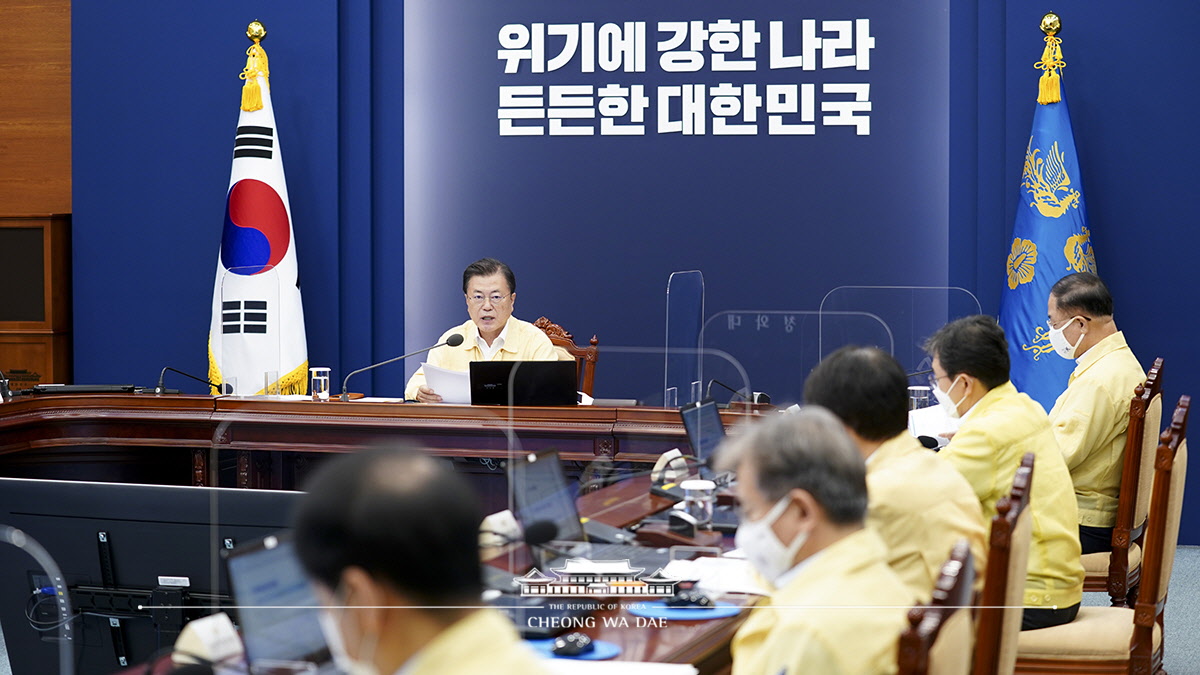이 웹사이트는 제19대 대통령 임기 종료에 따라 대통령기록관이 「대통령기록물 관리에 관한 법률」에 의해 이관받아 서비스하는 대통령기록물입니다. 자료의 열람만 가능하며 수정 · 추가 · 삭제는 불가능합니다.
다만, 「개인정보보호법」에 의하여 개인의 정보를 보호받기 원하시는 분은 관련 내용(요청자, 요청내용, 연락처, 글위치)을 대통령 웹기록물 담당자(044-211-2253)에게 요청해 주시면 신속히 검토하여 조치해 드리겠습니다. 감사합니다.
SPEECHES & REMARKS
BRIEFINGS
Remarks by President Moon Jae-in at Meeting with Economy-related Ministers to Discuss People’s Livelihoods

(Unofficial Translation)
The COVID-19 situation remains grave indeed. The fourth wave of the infections that began in the Seoul metropolitan area is spreading nationwide, causing great concern that the recovery of people’s livelihoods and the economy might be delayed. With epidemic prevention and control increasingly more challenging, it is all the more necessary to pay attention to the economic impact on people’s lives. Today’s meeting has been arranged as part of the effort to provide quick support to people whose livelihoods have been damaged by intensive anti-epidemic measures. I urge all of the economy-related ministries and agencies to renew their determination with the Deputy Prime Minister for economic affairs playing a pivotal role.
As people face increasing hardships in their economic activities due to the anti-epidemic situation, the Government must buttress their livelihoods through active fiscal spending. Given the spread of COVID-19, the supplementary budget increased from 33 trillion won to 34.9 trillion won, and assistance for those suffering damage has expanded significantly. From this moment on, swiftness matters. The budget should be disbursed swiftly with the top priority on helping to compensate desperate microbusiness owners.
Above everything else, microbusiness owners and the vulnerable urgently need relief from the painful weight that they are bearing. Instead of stop-gap remedies, long-term measures are needed now. When it comes to compensation for commercial losses in accordance with the relevant law, it should be made quickly without disruption as soon as the law takes effect in October. To this end, I urge you to do everything you can to prepare, including forming a committee to evaluate the requests for compensation. With regard to the Hope Recovery Funds that are intended to support losses that occur before October, a relevant system will have to be established as planned so that the funds can be disbursed as quickly as possible from August 17 – the day these funds will begin to be distributed.
Jobs are at the heart of people’s livelihoods and the economy. Support for employment retention should be further expanded, especially for business lines vulnerable to COVID-19, including travel and tourism. I urge you to implement various employment support projects without any disruption for young people, women and the elderly – those who are having difficulty finding jobs. The COVID-19 crisis should not become a “lost time” for young people. I ask you to do everything possible to provide a variety of assistance so that they can turn this into a “time for preparation” for the future.
In the throes of the COVID-19 crisis, it has been confirmed that a pandemic’s impact primarily hits the most vulnerable in our society. Throughout this crisis, we should be providing more extensive support to low-income families and the vulnerable. At the same time, we will also have to make policy-related efforts with a long-term perspective so that polarization does not take root as it did during the 1997 Asian financial crisis. When the mandatory family support obligations are completely abolished in October, about 50,000 more households will be entitled to living allowances. The planned establishment of a universal employment insurance system is also being pursued without any delays. We must prevent the crisis from widening disparities by strengthening the employment and social safety nets.
Expanding government-backed financing for low-income households is as crucial as the role of direct fiscal spending. I ask you to enhance access to loans through the new, state-backed financial products that target those whose credit ratings and incomes are low. Some people are inevitably behind in debt payments as they are having difficulties making ends meet due to COVID-19. I would like you to help increase the utilization of the debt rescheduling system through the Credit Counseling and Recovery Service. I also ask you to quickly come up with a credit recovery support plan for borrowers who have faithfully repaid their overdue debts in full even if some payments were temporarily delinquent.
Inflation concerns are growing around the world as liquidity rises in the course of responding to the crisis. Also, the recent heat waves and other factors have disrupted the supply of some goods. I urge you to focus the efforts to stabilize consumer prices especially on items with a great bearing on people’s daily lives, such as agricultural, livestock and fishery products. In particular, I ask you to see to it that prices will not spike in the lead up to Chuseok by preemptively expanding the supply of those commodities in high demand during the holiday.
Two days ago, the International Monetary Fund raised Korea’s projected economic growth for the year sharply from 3.6 percent to 4.3 percent. This is a reflection of our people’s potential and the trust in our economy. However, that rate can only be achieved if epidemic prevention and control measures are successful. In the course of surmounting three waves of COVID-19 infections, we provided the world examples for how to deal with the epidemic and the economy. In the same way that we have been successful to date, we can achieve our growth target and feed the flame of the recovery of people’s livelihoods if this fourth wave is also quickly put under control. I ask the people to come together once more.
The Government will do its utmost for a just recovery where support is primarily concentrated on those suffering the most from COVID-19, for an inclusive recovery that narrows disparities and for a complete recovery that revives jobs as well.
Thank you.



